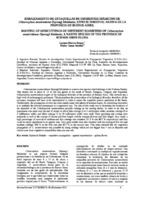Enraizamiento de estaquillas de diferentes diámetro de Citharexylum montevidense (Spreng) Moldenke, especie forestal nativa de la provincia de Buenos Aires
Rooting of minicuttings of different diameters of Citharexylum montevidense (Spreng) Moldenke, a native species of the province of Buenos Aires flora
Abstract
Citharexylum montevidense (Spreng.) Moldenke es una especie forestal indígena perteneciente a la Familia de las Verbenáceas. Es un árbol espinoso de unos 8 a 12 m. de altura y originario del sur de Brasil, Paraguay, Uruguay y Argentina. C. montevidense forma parte de la diversidad biológica de la provincia de Buenos Aires, territorio con un alto grado de antropización. Ello compromete la conservación de la diversidad biológica, por lo que habrá que implementar todas las medidas necesarias para asegurar el patrimonio genético vegetal para el futuro. Tradicionalmente, la propagación de árboles se ha realizado principalmente con plantas de origen seminal. Una alternativa interesante es multiplicar vegetativamente los fenotipos selectos. El objetivo de este trabajo fue determinar la incidencia del diámetro de las estaquillas juveniles de Citharexylum montevidense en la capacidad de enraizamiento. Para ello, se realizó una experimentación hacia fines de invierno donde se utilizaron estaquillas finas (3 a 5 mm de diámetro), medianas (5 a 7 mm de diámetro) y gruesas (7-10 mm de diámetro) en las que se analizó la brotación y enraizamiento, así como también número de brotes y longitud de los mismos y número de raíces y longitud de las mismas. Se obtuvo como resultado un porcentaje de supervivencia y brotación en las estaquillas finas y medianas muy alto, 514,3% y 48,7% respectivamente, pudiéndose reproducir en forma agámica con gran facilidad. Tambien se obtuvo buenos resultados de enraizamiento de las estaquillas finas y medianas vivas, 100% en el primer caso y 85,7% en el segundo. Este trabajo demostró la posibilidad de la propagación vegetativa de C. montevidense a partir de estaquillas que no superen los 7 mm de diámetro y que procedan de material vegetativo menor a un año. Citharexylum montevidense (Spreng) Moldenke is a native tree species which belongs to the Verbena Family. This thorny tree is about 8 -12 m tall and grows in the south of Brazil, Paraguay, Uruguay and Argentina. Citharexylum montevidense is part of the biological diversity of the province of Buenos Aires. This territory has a high level of anthropogenic pollutants. This jeopardizes the preservation of its biological diversity, therefore, all the necessary measures will have to be implemented in order to assure the vegetable genetic patrimony in the future. Traditionally, the propagation of trees has been mainly made with plants of seminal origin. An interesting altemative is to multiply the selected phenotypes in a vegetative way. The aim of this study was to determine the incidence of the diameter of the Citharexylum montevidense juvenile cuttings in the rooting ability. In order to do this, an experiment was made near the end of winter in which thin cuttings (3 to 5 millimeters wide), médium cuttings (5 to 7 millimeters wide), and thick cuttings (7 to 10 millimeters wide) were used. Their sprouting and rooting were analyzed, as well as the amount of shoots and their length, and the amount of roots and their length. As a result, a high percentage of survival of médium and thin cuttings was obtained (51.3 % and 48.7 % respectively) and they could be easily reproduced in an agamic way. Very good results were also obtained with the rooting of live thin and médium cuttings: 100 % in the First case and 85.7 % in the second case. This study showed that the vegetative propagation of C. montevidense was possible by using cuttings which are not bigger than 7 mm in diameter and which come from vegetative material less than one year oíd.
URI
https://hdl.handle.net/20.500.12219/2736http://www.yvyrareta.com.ar/index.php/ediciones-anteriores/diciembre-2013-n20/item/358-diciembre-2011-n-18
Collections
- Revista Yvyraretá [360]
The following license files are associated with this item:




